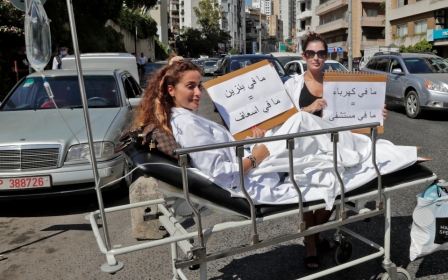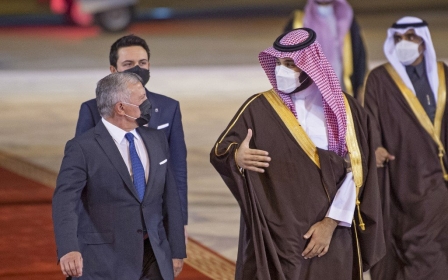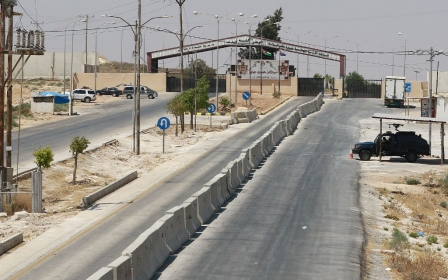Jordan and Syria put politics aside and begin rebuilding diplomatic links

The visit of Syria’s defence minister and chief of the armed forces, General Ali Ayyoub, to Jordan on 19 September marked a change in the frosty relationship that has existed between Damascus and Amman for the past decade.
Jordan and Syria have been on opposite sides since the beginning of the Syrian civil war in 2011, with embattled Syrian President Bashar al-Assad allying with Russia, while Jordanian King Abdullah II sided with the United States.
But Ayyoub’s visit may mark a diplomatic turning point, with other high-ranking Syrian officials expected to visit Amman in the future. But how is the Hashemite kingdom justifying its political about-face?
Security considerations
Now into its tenth year, the conflict in Syria has created the world's worst refugee crisis with over 5.6 million Syrians fleeing to neighbouring countries and over one million living in Europe.
New MEE newsletter: Jerusalem Dispatch
Sign up to get the latest insights and analysis on Israel-Palestine, alongside Turkey Unpacked and other MEE newsletters
Around half a million people have been killed in the Syrian conflict, including thousands of people held in Syrian intelligence prisons who have died as a result of brutal torture.
A UN report earlier this month documented a recent increase in fighting within Syria accompanied by a "return of sieges and siege-like tactics" in some parts of the country - including in the southwestern Daraa province, the birthplace of Syria's revolution and one of the last bastions of rebel fighters.
Damascus had previously accused Jordan of training rebel fighters and allowing them to enter Syria through its border.
Relations between the two countries degraded to the point where Jordan kicked Syrian Ambassador Bahjat Suleiman out of the country in 2014.
But according to official Jordanian news agency Petra, the meeting between Ayyoub and Jordanian army chief of staff General Yousef Huneiti was aimed at “ensuring the safety of the joint borders between the two countries, the situation in south Syria, fighting terror and working together to stem drug smuggling”.
According to retired Jordanian general Maamoun Abu Nuwar, the Syrian defence minister’s visit aimed to “increase border security after the Syrian army regained sovereignty over the southern areas close to the Jordanian border.”
The Syrian-Jordanian border has been repeatedly closed since 2015 due to the presence of various armed groups around the border crossing point of Jaber-Nasif.
But pro-Assad forces regained control over all areas bordering Jordan earlier this year after an agreement with the rebels in Daraa, which included a handover of weapons.
“The key is ensuring that the chaos in Syria is not transferred into Jordan,” Abu Nuwar told Middle East Eye.
The retired general said that Amman had received assurances that Iran-backed militias would not be in the border area now that Jordan has received a waiver from the US’s Caesar Act, which had placed sanctions on any trade with the Syrian government.
Mutual interests
The visit comes as Jordan has recently sought to normalise ties with Assad - a strong reversal from the government’s previous stance.
In 2017, King Abdullah had implied to the Washington Post that Assad should resign. “Common sense dictates that somebody who is the figurehead of such bloodshed towards his people probably will move on,” the monarch said at the time.
But Abdullah has since adopted a more pragmatic approach, telling CNN in July that Assad and his government were staying in Syria for a long while, and that dialogue and coordination were hence needed.
On 19 August, Jordanian Prime Minister Bisher al-Khasawneh said that Jordan and Egypt were pushing to reintegrate Syria into the Arab League. “Jordan and the government of Egypt, as well as other brotherly countries, wish for Syria to regain its seat in the Arab League,” the premier told the Arabic version of the Independent.
Jordanian commentator Malek Athamneh sees this change as “in the interest of both sides”.
“This rapprochement between the two countries benefits their own interests,” he told MEE. “Ever since the visit by King Abdullah II to the White House [in July] and his discussion of the Syrian and Lebanese issues, Washington has understood Jordan’s position of trying to change the Syrian attitude rather than change the entire regime.
“As a result, Jordan was able to obtain a waiver for the movement of products and the transfer of electricity to Lebanon via Syria, and all of this has improved chances for a new regional understanding.”
Economic considerations
Meanwhile, Jordan’s Minister for Media Affairs Sakher Dudin revealed in a closed meeting with Jordanian radio producers last Thursday that “a meeting of Syrian and Jordanian ministers will take place in coming weeks to discuss a variety of economic issues between the two countries”.
According to Dudin, “meetings are planned for energy, water, and agriculture ministers, which will fit in well with the government’s new plans for the upcoming phase of relations with neighbouring countries aimed at economic development”.
A meeting was in fact held in Amman on 8 September between the energy ministers of Egypt, Syria, Lebanon, and Jordan, in which they discussed the details of getting Egyptian gas to Lebanon via Syria and Jordan.
“Jordan and the US understand that a realistic look at the political scene requires an understanding that the idea of changing the regime is no longer valid now that Syrian authorities have spread their sovereignty throughout their country,” Khaled Shneikat, the former president of the Jordanian Society for Political Sciences, told MEE.
Jordan, which hosts 1.3 million Syrian refugees, has been economically hurt by the cut in ties with Syria and the closure of the borders. Jordan’s trade balance with Syria dropped from $615m in 2010 to $94m in 2020, according to official Jordanian statistics.
“Jordan and a number of western countries see that stability in Syria is a priority over the presence of military groups causing problems,” Shneikat said.
With the Syrian conflict far from over and the country struggling with the economic, social, and political ramifications of the war, it remains to be seen whether Amman’s new gamble will pay off.
Middle East Eye delivers independent and unrivalled coverage and analysis of the Middle East, North Africa and beyond. To learn more about republishing this content and the associated fees, please fill out this form. More about MEE can be found here.






